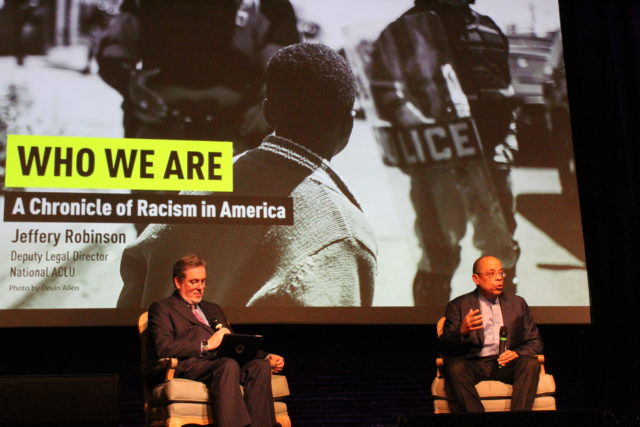
By Ameera Steward
The Birmingham Times
Jeffery Robinson chronicles racism in America, and it just so happened that he was in Birmingham not long after 21-year-old Emantic Fitzgerald “E.J.” Bradford Jr. was killed by a Hoover Police Department (HPD) officer on Thanksgiving at the Riverchase Galleria mall.
Robinson is a deputy legal director and the director of the American Civil Liberties Union (ACLU) Trone Center for Justice and Equality.
On December 5—less than two weeks after Bradford Jr. was killed—Robinson was at Birmingham’s Lyric Theater for an event titled, “A Conversation with Jeffery Robinson. Who We Are: A Chronicle of Racism in America,” hosted by the Birmingham Bar Foundation (BBF).
The program, which was scheduled earlier this year, was part of a series that Robinson has presented across the nation to teach about the history of racism in America.
Using the shooting of Bradford Jr. as an example, Robinson pointed out what some officials have said about having a gun in certain situations.
“The head of the NRA [said], ‘The only thing that stops a bad guy with a gun is a good guy with a gun.’ Well, apparently the Second Amendment and the right to use a weapon to protect yourself, your community, does not apply if you are black,” he said.
Robinson also said there is no difference when it comes to “unconscious bias” versus “deliberate racism.”
“If you shoot me in the mall because you have unconscious bias against black people and you are afraid of us or if you shoot me in the mall because you are a rabid [Ku Klux Klan] card carrying bigot, I am just as dead,” he said.
“Tipping Point”
Like America during the Civil Rights Movement, the U.S. today is again at a “tipping point” to see who we really are, Robinson said.
“Well, we are once again at a tipping point in 2018 . . . once again young activists, like the activists in the Black Lives Matter movement, are making America take a look at who we really are. … This time when it determines whether we’re going to move forward or tip backward, it’s going to be us. … We’re the ones that are going to determine that this time.”
Robinson used the Oklahoma City bombing, the domestic terrorist truck attack in the Alfred P. Murrah Federal Building in on April 19, 1995, as an example of how people react to alleged crimes committed by blacks and whites.
“When you found out who did [the bombing], did you fear young white men in military uniform?” he asked. “None of us did because we know for a fact that it is completely insane to judge an entire group of people … by the actions of one person. … Why is it that we have such a hard time understanding that concept when you take out the word ‘white’ and you put in another word, like ‘black’ or ‘Muslim’?”
“Think Real Hard”
Robinson’s lecture included a timeline of history as it pertains to racism. He pointed to a law passed in 1669 that declared it legal to “kill a slave while correcting because malice could not be presumed.” It was called the Casual Killing Act 1669.
“I am not here to tell you that police departments today are slave patrols, because they’re not,” Robinson said. “What I am here to [say is] think about the number of unarmed black and brown men and women that have lost their lives at the hands of police. Now, think real hard, how many police officers can you remember that have been prosecuted for anything in the last three or four years? That law may not be on the books anymore, but there are some people that will say it’s still in effect.”
“A Brilliant Document”
Robinson pointed out that 41 of the 56 people who signed the Declaration of Independence owned other people as property. He also read some segments and amendments from the U.S. Constitution to show that there was no secret.
“People have often said the Constitution is such a brilliant document. I agree, it is brilliant. Here’s one of the ways it is brilliant: … the folks who wrote it were determined that they were going to have another 20 years or so to keep importing enslaved people from Africa.”
“Try Something Different”
Robinson encouraged audience members to study history for themselves.
“Our narrative in America about who we are when it comes to race is simply not the truth,” he said. “I encourage all of you to go and start looking yourselves because if the narrative that we have all believed is pointed out as false, we all have to take a step back and [ask], ‘Well, what do I do now?’”
“It’s at that moment, when we recognize that the narrative we have been brought up on is not the truth, … that people are willing to try something different, people are willing to do something they haven’t done.”
He also noted that his conversation in Birmingham was on December 5, the night 63 years ago when there was a meeting at which a young man became president of the Montgomery Improvement Association, which was the vehicle behind the Montgomery Bus Boycott. That young man was the Rev. Dr. Martin Luther King Jr.



